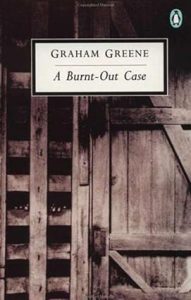
Set in a leper colony deep in the Congo, on the cusp of African decolonization, an atheist doctor from Europe and members of a Catholic religious order from Belgium cooperate in caring for society’s most rejected. Located in the remote, humid jungle far from the nearest town of Luc, Doctor Colin and the priests are happy to keep their leprosarium and patients out of the prying public eye. When a mysterious, withdrawn European man called Querry arrives by boat and asks for lodging, he’s welcomed but also met with some suspicion. Who in their right mind and with wholesome motives treats a leper colony like a holiday resort or a place to rest? Querry offers to assist in whatever way he can and he has a quiet, humble demeanour. Yet he fails to tell his hosts one rather important detail: he’s a famous architect with prestige and name recognition throughout Europe, having designed some of the continent’s most celebrated modern churches and cathedrals.
Querry — thoroughly burnt-out, jaded, depressed, and having lost his faith in both God and himself — had decided to travel to the ends of the world in order to disappear and to suffer. In his dreary state of mind it’s less dissonant to be uncomfortable than to live in the opulence that he could easily afford. Ultimately, Dr. Colin and the Superior who oversees the mission are too busy with their difficult vocation to worry very much about what brought Querry here and who he might be.
Querry is assigned a servant called Deo Gratias — a badly mutilated leper who had lost all his fingers and toes to the dreadful disease. We learn in this novel that once leprosy runs its awful course and leaves the victim scarred and disfigured, there’s no longer any risk of infection and the patient can try to rebuild their life, or what’s left of it. These are called burnt-out cases — the leprosy has essentially burned itself out, leaving the victim alive and pain-free, but a shadow of their former self. The price of not suffering permanent pain is mutilation, while those who aren’t totally disfigured and keep their palsied fingers and toes will face a lifetime of physical agony. In a sense, as odd as it is to say or think, mutilation is a terrible blessing in disguise.
One day, Deo Gratias finds himself lost and injured deep in the Congolese jungle. It’s Querry who goes looking for the lone lost servant and saves his life. He spends a long night with him in the dark wilderness. There are clear biblical undertones to the story. When Rycker, the manager of a plantation that produces palm oil, hosts Querry overnight during a journey to town, he discovers the secret identity of his mysterious guest. And as a zealous Catholic, Rycker is mesmerized by the story of how Querry saved his servant’s life. He’s convinced that he is in the company of not only a celebrity, but a faithful Catholic hero and a saint. Querry tries to dissuade him of this. Although Rycker promises Querry not to tell anyone who he is, discretion proves too difficult. He shares the news with the European colonial elite in Luc. As word spreads, a predatory journalist from Britain, on the hunt for a good story, travels to the Congolese leper colony.
While the last thing that the Superior and Dr. Colin want is international media attention, they realize that having a world-class architect on hand means that he can design a new hospital for the leper colony. Querry goes to work and rediscovers some semblance of the vocation and passion that he had lost. But with a journalist looking for a lucrative scoop and Rycker’s obsession with Querry, disaster hangs over the horizon.
A Burnt-Out Case is one of Graham Greene’s “Catholic” novels — these are his books where belief, disbelief, and Catholicism are at the heart of the story. Published in 1960, this one is the last of these and I found that it reads quite differently from The Power and the Glory, Brighton Rock, The End of the Affair or The Heart of the Matter. There’s no triumphalist Catholicism here and gone are the grand, even lavish theological meditations on damnation. The religious language and imagery of A Burnt-Out Case is more understated and less lyrical. That’s appropriate for a couple of reasons. First, the protagonist is thoroughly laconic, uninspired and emotionally detached from nearly everyone and all things. Second, the Catholic order running this mission in the jungle is practically-minded. They serve the most extreme margins of society and they are thoroughly occupied with addressing the many temporal needs of people facing the worst suffering imaginable. Long, theological self-reflections would seem indulgent against the backdrop of this desperate, tortured landscape.
This isn’t to say that A Burnt-Out Case is devoid of beautiful, thoughtful passages. It isn’t at all. But there’s a gentle restraint that is much less present in his other Catholic novels. This passage is an example of it:
White flowers had opened with twilight on the long avenue; fires were being lit for the evening meal, and the mercy of darkness was falling at last over the ugly and the deformed. The wrangles of the night had not yet begun, and peace was there, something you could touch like a petal or smell like wood smoke. Querry said to Colin, ‘You know I am happy here.’ He closed his mouth on the phrase too late; it had escaped him on the sweet evening air like an admission.
The most Christ-like figure in this novel is the atheist doctor, Colin. He’s a widower — his wife also led a life of service, died and was buried in the leper colony. Serious, dedicated and willing to sacrifice everything for lepers, Dr. Colin is a deeply appealing character. His colleague, the Superior, a chain-smoking priest clearly comfortable in his skin, pastoral and sometimes jovial, is equally dedicated to improving the lives of the lepers in his mission. There’s a scene with some muted humour, where he becomes particularly likeable. He’s perusing a catalogue and sees photographs of European bidets. He doesn’t know what they are and thinks that they must be foot baths. He then realizes what a great asset these foot baths could be for the lepers. If only he could convince some wealthy benefactor to donate these to his mission.
All except one of the Superior’s priests are engrossed in the temporal needs of lepers and finding ways to serve them. The one exception is the scrupulous Father Thomas. He feels that his brother priests have neglected the spiritual side of their mission by focusing so much on temporal concerns. He’s pious and he comes to believe that Querry is a saint and a man of profound faith. Querry tries his utmost to convince the stubborn Father Thomas of the contrary. The more he speaks of his lack of faith, the more Father Thomas puts him on a religious pedestal. “Don’t you see that perhaps you’ve been given the grace of aridity,” he says to Querry, after he repeated that he has no faith at all and that he has “worked it out of [his] system — like women.”
It would have been so easy for Greene to have gone the route of a dichotomy — comparing the pragmatic, liberal and enlightened Superior to a neurotic, traditionalist and overly pious Father Thomas. To be sure, Father Thomas is searching for a heroic Catholicism. “When I finished at the seminary I sometimes thought that only by martyrdom could I save myself,” he confides in Querry. He sees priesthood as a heroic spiritual battle, while his brother priests seem like dull social workers. But when Greene paints a picture of Father Thomas’ vulnerability, notably that he’s scared of the dark and dreads the night when the lights go out in their little clearing in the jungle, it’s hard not to empathize with him.
There are two villainous characters in this story: Rycker, the plantation manager, and Parkinson, the journalist. Rycker married a woman so much younger than himself, that she is depicted and treated as little more than a child in the novel. There’s a grotesque element to this. His attempts at social climbing within vapid colonial circles aren’t much better. But Rycker is also a bit pathetic and that’s his one mildly endearing characteristic. Parkinson, by contrast, is irredeemable. He’s an amoral, vicious and dishonest character.
What then to make of Querry? It’s not a stretch to relate to his sense of burn-out. When we learn about how he designed cold, modern churches only to be disgusted by the tasteless, ignorant faithful taking possession of his buildings and modifying his masterpieces with stained glass and tacky decor, the impression we get is of an arrogant artist looking down on the unwashed masses. His prior romantic affairs and escapades with women also point to callous selfishness and narcissism. But whatever pride or sense of superiority he once had has been burned away. He appears to genuinely seek penance. Querry is an agnostic who is pained by, and struggles with his loss of faith. He gains dimension when he interacts with the atheist doctor who never had a Christian faith to lose, yet who models Christ more than anyone else.
A Burnt-Out Case is in very large measure about vocations — both religious and secular. Anyone can have a vocation, especially when one’s job is about more than going to work in the morning, but rather a mission that transcends one’s immediate self-interest and existence. The question that Graham raises, however, is this: to what degree is anyone’s vocation driven by altruism rather than self-interest?
Greene speaks of leper colonies in Africa from some personal knowledge, having visited several in both Congo and Cameroon. At times in this narrative, Greene offers an almost granular description of lepers and their surroundings — something only possible when one has seen these hidden places with one’s own eyes. Around the edges of this novel there are hints as well that what we’re reading about is a vanishing world. Dr. Colin and the Superior’s priests know that leprosy is increasingly treatable and leprosariums will be things of the past, alongside colonial rule in Africa, which is unravelling in this same era. This demise is good and the protagonists in this story know it, even as they also wonder what remains of their vocation and life purpose when everything around them changes.

Superior review…of both form and content